#anna letitia barbauld
Text
Hence, the more wild, fanciful, and extraordinary are the circumstances of a scene of horror, the more pleasure we receive from it; and where they are too near common nature, though violently borne by curiosity through the adventure, we cannot repeat it or reflect on it, without an over-balance of pain.
"On the Pleasure Derived from Objects of Terror," Anna Letitia Barbauld
12 notes
·
View notes
Text
"The dead of midnight is the noon of thought."
—Anna Letitia Barbauld
#quotes#anna letitia barbauld#spilled ink#night quotes#late night thoughts#night#midnights#midnight#dark academia#life quotes#spilled thoughts#academia aesthetic#poetry#food for thought#thoughts
14 notes
·
View notes
Text

Commonplace Entry 15: Anna Letitia Barbauld's Washing Day
"Ye who beneath the yoke of wedlock bend with bowed soul...no comfort, nor pleasant smile, no quaint device, but silent breakfast anxious looks... Saints have been calm upon the rack" (51).
Barbauld's "Washing Day" is as much of an expose of the torturous nature of women's household chores in the 17th century as much as the institution of marriage that requires it of them. She compares marriage to the yoke that oxen (domesticated labor animals) carry. The tragedy is made yet more apparent in contrast to the men who are in "silken balloons" sporting around. Meanwhile the women carry the load for two and more. The "evil day" that is laundry day is akin to a torture sentence. To Barbauld, even saints or martyrs "upon the rack" are more comfortable than the women on washing day.
Barbauld, Anna L. Washing Day, The Norton Anthology of English Literature, 10th Edition, Volume D, The Romantic Period, New York, London, W.W. Norton Company, 2018, pp.51.
#Anna Letitia Barbauld#humanvalue#historicalsatire#theother#critiqueofmarriage#valueofwomen#Washing Day
0 notes
Text
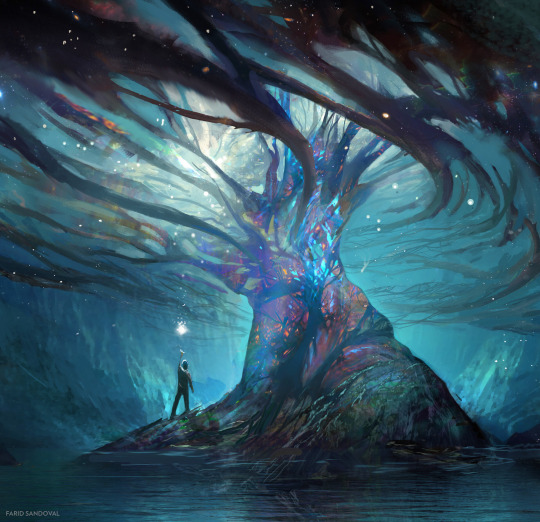
The Romantics 🌹📚
There is a land, where the roses are without thorns, where the flowers are not mixed with brambles. In that land, there is eternal spring, and light without any cloud. The tree of life groweth in the midst thereof;
——
Anna Letitia Barbauld
#Art 🎨 by Farid Sandoval, Artstation
0 notes
Text
Yellow
Oh yellow, such a feast for eyes.
Fruits of anther bursting forth to catch the gaze
Of the striped bee who races to its matching hue.
Oh dripping honey of Apollo’s goldenrod
That slices through thickets of cloud,
Dripping unto the sprawling meadows we trod.
Wide plains of Sun rays
Pour into your iris to illuminate
New colours brought forth
Colours to coat your line of sight,
Yellow to mark your day’s arriv’d,
Yellow to bid my dark adieu,
Yellow to lead my light to you.
Bruis’d by Blue’s sharp staccato
Yellow took us in and
Gave us Solace lasting
Solar fasting broken, we rise
Solar Yellow once again
Settles in our souls,
Graciously it tends.
Do not sip as if its drip will end
But drink until the next tomorrow.
Unlike Demeter in Winter’s end,
He is plentiful, but
Each night hidden
And each morning replenish’d.
Drink! Drink in unison and in solitude,
Drink in as gold drips.
As the bee chases colour,
Chase Yellow into pink sunset,
Take Yellow found and
Paint sunshine into each page written.
Hold buttercup to skin
And become Yellow,
Whistle golden tones into
The ears of every soul you meet.
Mix your Yellow with that wretched Blue
And plant Green into soil,
To sprout and to bloom.
1 note
·
View note
Text
Epistle to William Wilberforce by Anna Letitia Barbauld
William Wilberforce, after John Rising. Stipple engraving, after 1789. NPG D37514, National Portrait Gallery. https://creativecommons.org/licenses/by-nc-nd/3.0/
Poem by Mrs. Anna Letitia Barbauld, 1743-1825.
London: Printed for J. Johnson, No. 72, St. Paul’s Church-Yard, 1791.
Epistle To William Wilberforce, Esq. on the Rejection of the Bill for Abolishing the Slave Trade
Cease, Wilberforce,…
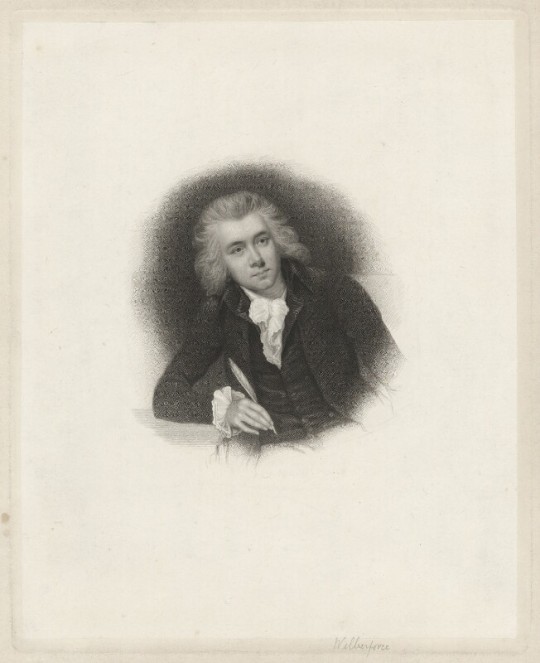
View On WordPress
0 notes
Text
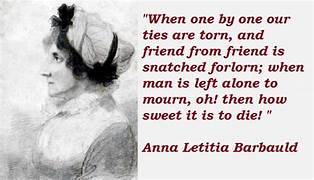
Alredered Remembers British writer, poet, and editor Anna Barbauld, on her birthday.
"We neither laugh alone, nor weep alone, why then should we pray alone?" -Anna Letitia Barbauld
0 notes
Text
1. Ruston
https://www.liverpool.ac.uk/literature-and-science/archive/archiveofthepoetryandsciencehub/essays/ruston_hist/#Footnote2
- A friend of Aikin’s from the Warrington Academy, and another of Johnson’s authors, Thomas Percival, also wrote extensively about the importance of natural knowledge to poetry, revealing, I think, the fact that this was a preoccupation of their particular circle.
=> natural history -> but not specifically geography
McCarty & Kraft
Anna Letitia Barbauld, ‘The Invitation’, in Selected Poetry and Prose, ed. by William McCarthy and Elizabeth Kraft (Ontario, Broadview Press, 2002), ll. 128, 110. All of Barbauld’s poetry is quoted from this edition.
- “the natural” / something not educated /
For this reason even in studies of the history of humankind ‘nature takes precedence of art’ (1800, II, 311). Barbauld also tried to imagine a more ‘natural’ human being, one ‘uncorrupted by various social malpractices’; according to William McCarthy and Elizabeth Kraft
She seeks, both in herself and in others, to cultivate the disposition (which she assumes exists) to respond ‘naturally’ to experience. The ‘natural’ response is the response that has not been dulled by repetition, smothered by false cleverness, tutored by mere intellectuality, or perverted by self-interest. (Barbauld, p. 21)
the arguments I have set out here seem to prefigure debates regarding the relationship between poetry and science.
0 notes
Link
“If you think of early Gothic women writers, your mind probably leaps to Mary Shelley. She does tend to get all of the attention: her own books, her own films, cameos in Doctor Who… you can’t help but be happy that a woman writer is getting the attention she deserves.
(...)
But that brings me to my axe to grind, the Gothic fly in my witch’s broth. As we dust Mary Shelley off for the umpteenth time and parade her once more into the limelight, we’re losing sight of the fact that she was far from alone. She was one of a pantheon of some of the most badass women writers of all time. Early Gothic literature heroines whose lives and legacies are more thrilling than fiction. Spare a thought for the other real life Gothic heroines of that period. Making publishing history, crossing war-torn Europe, seducing princes, becoming an underground powerhouse in the male-dominated theology industry, defying society at every turn and figuring as some of the key thinkers of early feminism. Let me introduce you to five other real-life heroines of the Gothic who deserve just as much attention as Mary Shelley.”
#history#women in history#women writers#gothic literature#mary shelley#mary wollstonecraft#Charlotte Dacre#Mary Robinson#Anna Letitia Barbauld#Ann Radcliffe#many things I want to read here#I want to read more gothic novels#gothic novels
35 notes
·
View notes
Text
Pleasure Derived From Objects of Terror
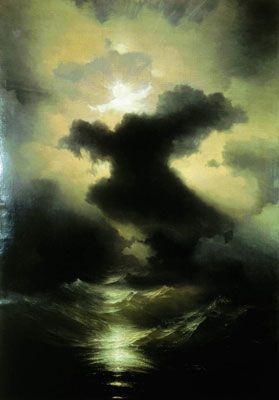
“Hence the more wild, fanciful, and extraordinary are the circumstance, of a scene of horror, the more pleasure we receive from it; and where they are too near common nature, though violently borne by curiosity through the adventure, we cannot repeat it or reflect on it, without an overbalance of pain” (Anna Letitia Barbauld & John Aikin, 521).
This excerpt occurs when Barbauld is commenting on the human imagination and the appeal and draw to horror.
I connected to this excerpt because it communicates my feelings on horror precisely. The outrageous, not-so-realistic elements of horror are bearable for me, and even in some cases, enjoyable. I’ve found that I don’t find these instances of fanciful horror as striking or hard to stomach as realistic horror. Barbauld’s assumption that “we cannot repeat it or reflect on it, without an overbalance of pain” felt personal. When the veil between reality and horror becomes thin, almost invisible, I feel an intense desire to run the other direction. Plausibility is, in many respects, more terrifying than any number of demons, monsters, ghosts, and ghouls. When reading Barbauld, it became clear that horror functions as ultimate escapism, because not only is there the immersion that occurs in all art genres, but there is a suppression of emotion and feeling outside of fear. The fear is only palatable and tolerable when it exists so far outside the realm of reality, that it is impossible to draw comparisons to one’s life. Barbauld’s argument gave me a deeper understanding of and appreciation for horror and those that find pleasure, even comfort, in its dark embrace.
#Anna Letitia Barbauld#Gothic#Horror#Terror#Fear#Escapism#Reality#Romanticism#long18thcentury#Sublime#Emotions#ivan aivazovsky#Chaos
5 notes
·
View notes
Text
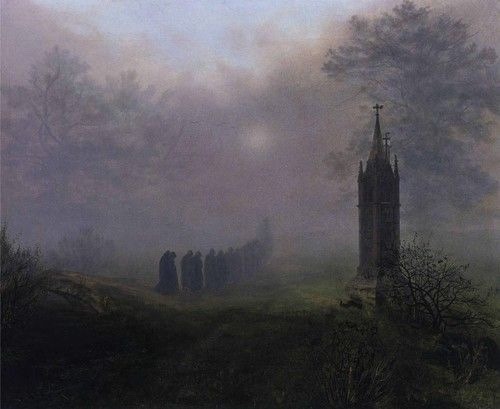
“The pain is suspense, and the irresistible desire of satisfying curiosity, when once raised, will account for our eagerness to go quite through an adventure, though we suffer actual pain during the course of it. We rather choose to suffer the smart pan of violent emotion than the uneasy craving of an unsatisfied desire.” (Anna Letitia Barbauld and John Aiken, On the Pleasure Derived from Objects of Terror, 521)
This quotation serves the purpose of why individuals would read and enjoy gothic novels or novels that heavily feature the idea of terror. It shows how it is the emotion and curiosity of the reader that causes them to read these books despite the darkness of the content itself.
This quotation REALLY resonated with me! To me the draw to reading/watching gothic or horror stories. It’s like an adrenaline rush but of curiosity. I crave to know what wild things are happening within the stories and to see what the resolution will be. The scenes of terror just help propel that curiosity further. Also this quote uses the word “adventure” when describing these novels! It truly is an adventure following the hero or heroine through their journey in trying to escape or defeat the villain of the story. It’s great to escape within the pages to run through dungeons, decaying castles, and forests. I rather be horrified or unsettled than not know what happens within the book or the movie - I have to finish them no matter what. This quotation just perfectly encapsulates my love of spooky things!
#romanticism#commonplacing#classicism#horror#gothic#terror#escapism#emotion#suspense#anna letitia barbauld
5 notes
·
View notes
Text
“The Caterpillar”by Anna Letitia Barbauld
No, helpless thing, I cannot harm thee now;
Depart in peace, thy little life is safe,
For I have scanned they form with curious eye,
Noted the silver line that streaks thy back,
The azure and the orange that divide
Thy velvet sides; thee, houseless, wanderer,
My garment has enfolded, and my arm
Felt the light pressure of thy hairy feet;
Thou hast curled round my finger; from its tip,
Precipitous descent! with stretched out neck,
Bending thy head in airy vacancy,
This way and that, inquiring, thou hast seemed
To ask protection; now, I cannot kill thee.
Yet I have sworn perdition to they race,
And recent from the slaughter am I come
Of tribes and embryo nations: I have sought
With sharpened eye and persecuting zeal,
Where, folded in their silken webs they lay
Thriving and happy; swept them from the tree
And crushed whole families beneath my foot;
Or, sudden, poured on their devoted heads
The vials of destruction.--This I have done,
Nor felt the touch of pity; but when thou,--
A single wretch, escaped the general doom,
Making me feel and clearly recognise
Thine individual existence, life,
And fellowship of sense with all that breathes,--
Present’st itself before me, I relent,
And cannot hurt thy weakness.--So the storm
Of horrid war, o’erwhelming cities, fields,
And peaceful villages, rolls dreadful on:
The victor shouts triumphant; he enjoys
The roar of cannon and the clang of arms,
And urges, by no soft relentings stopped,
The work of death and carnage. Yet should one,
A single sufferer from the field escaped,
Panting and pale, and bleeding at his feet,
Lift his imploring eyes,--the hero weeps;
He is grown human, and capricious Pity,
Which would not stir for thousands, melts for one
With sympathy spontaneous:--’Tis not Virtue,
Yet ‘tis the weakness of a virtuous mind.
3 notes
·
View notes
Quote
The well taught philosophic mind to all compassion gives; casts rounds the world an equal eye, and feels for all that lives.
Anna Letitia Barbauld
4 notes
·
View notes
Quote
This dead of midnight is the noon of thought.
Anna Letitia Barbauld
#not so motivational quotes#motivational#positive thinking#laws of universe#law of attraction#intentions#manifestation#manifesting#abundance#quotes#loa#money#love#tips#inspiration#inspiring quotes#Anna Letitia Barbauld
2 notes
·
View notes
Link
#bookish#gothic#Mary Shelley#Mary Wollstonecraft#Charlotte Dacre#Mary Robinson#Anna Letitia Barbauld#Ann Radcliffe
0 notes
Photo

'The well taught philosophic mind To all compassion gives; Casts round the world an equal eye, And feels for all that lives.' -Anna Letitia Barbauld | See more daily motivational quotes at Jar of Quotes.
#Anna Letitia Barbauld#positive#positive quotes#quote#quotes#sayings#words#image#inspirational#life#bored#lol'
43 notes
·
View notes